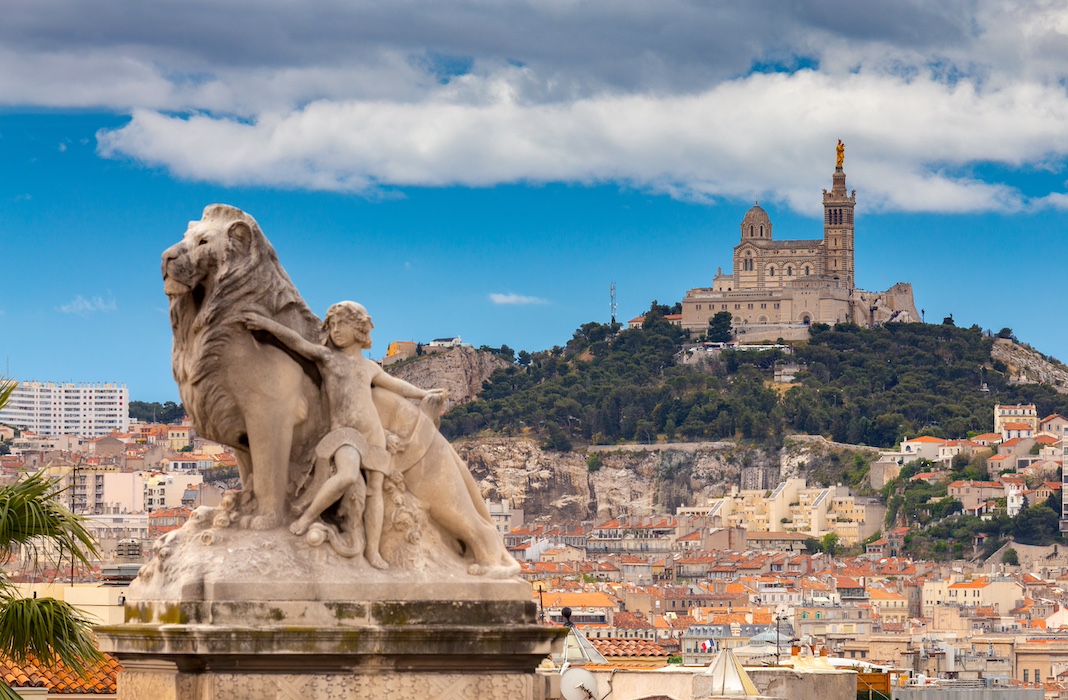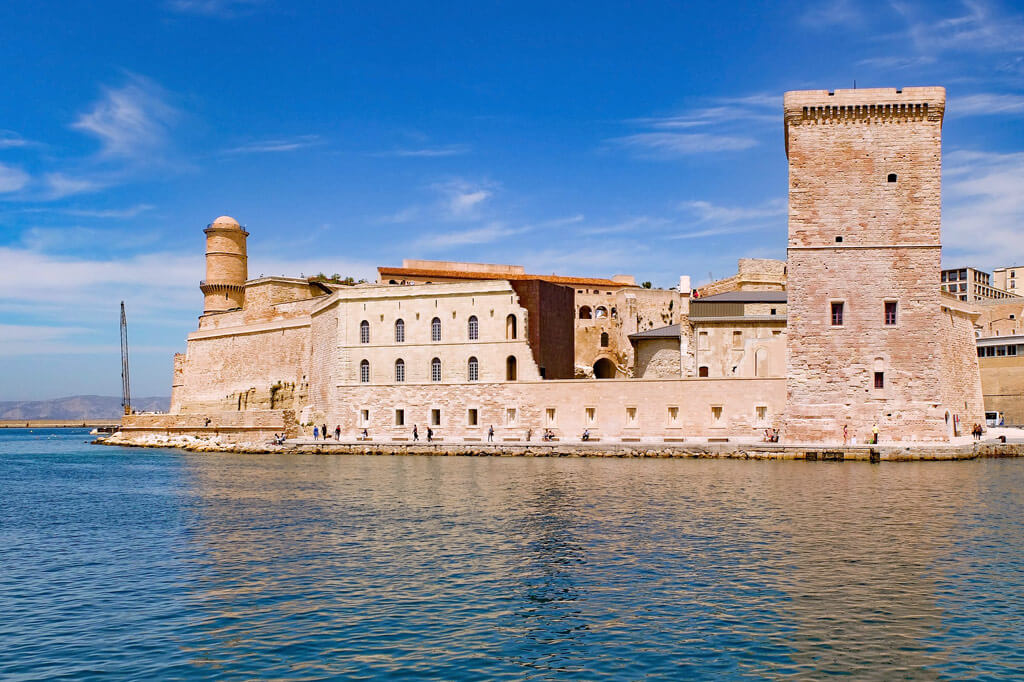
Introduction
Overview of Marseille
Marseille, the vibrant port city in southern France, is known for its rich history, diverse culture, and stunning Mediterranean coastline. As France’s second-largest city, Marseille boasts a unique blend of old-world charm and modern amenities, making it an exciting destination for travelers.
Why Visit Marseille
There are numerous reasons to consider visiting Marseille:
- Cultural Diversity : Experience a melting pot of cultures, reflected in its cuisine, festivals, and local art.
- Historical Significance : Explore landmarks that tell the story of its ancient origins.
- Stunning Scenery : From the stunning coastline of Calanques National Park to the panoramic views from Notre-Dame de la Garde, the city offers breathtaking vistas.
With its warm climate, friendly locals, and gastronomic delights, Marseille truly has something for everyone, inviting visitors to create unforgettable memories.

Vieux Port (Old Port)
History of Vieux Port
Vieux Port, or the Old Port, is the historical heart of Marseille, dating back over 2,600 years. It originally served as a bustling trading hub for the Greeks and later became a vital military port. Today, the port reflects its rich past through its picturesque surroundings and iconic landmarks.
Activities at Vieux Port
Visiting Vieux Port offers a myriad of activities to enhance your experience:
- Stroll Along the Quays : Enjoy a leisurely walk by the water, taking in the sights of fishermen and sailing boats.
- Visit the Fish Market : Early risers can catch the vibrant fish market, where local vendors sell fresh catch.
- Dining : Discover waterfront restaurants serving delicious seafood dishes like bouillabaisse.
As you immerse yourself in the lively atmosphere, you’ll appreciate how Vieux Port connects the city’s storied past with its vibrant present, making it a must-see destination in Marseille.
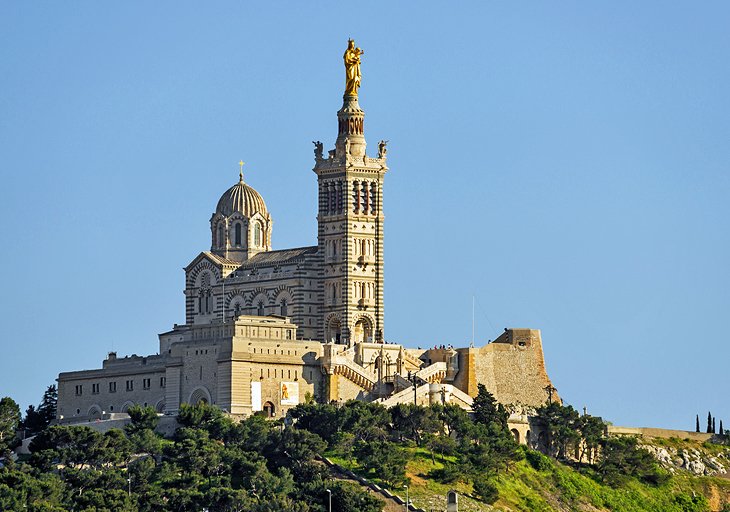
Notre-Dame de la Garde
Description of the Basilica
Perched high on a hill overlooking Marseille, Notre-Dame de la Garde is a breathtaking basilica that combines Romanesque and Byzantine architectural styles. Its interior is adorned with colorful mosaics and intricate sculptures, while the iconic gold-plated statue of the Virgin Mary watches over the city from the dome’s pinnacle.
Panoramic Views from Notre-Dame de la Garde
One of the highlights of visiting Notre-Dame de la Garde is the stunning panoramic views it offers:
- Breathtaking Outlook : Gaze upon the sprawling cityscape of Marseille and its blue Mediterranean coastline.
- Photo Opportunities : Capture unforgettable photos from various viewing points that showcase both urban and natural beauty.
- Perfect Sunset Spot : As the sun sets, enjoy a magical display of colors illuminating the sky and the city below.
Whether it’s reflecting on the city’s beauty or admiring the basilica’s stunning architecture, a visit to Notre-Dame de la Garde is an experience that will linger in your memory.

Le Panier District
Cultural Charm of Le Panier
Le Panier, Marseille’s oldest district, exudes a unique cultural charm that captivates visitors. Cobblestone streets, vibrant murals, and colorful houses create a picturesque setting reminiscent of a Mediterranean village. As you wander through this artistic enclave, you’ll find an eclectic mix of galleries, artisan shops, and local cafes that reflect the area’s creative spirit.
Must-Visit Places in Le Panier
While exploring Le Panier, don’t miss these must-visit spots:
- La Vieille Charité : An architectural gem, this former almshouse now houses museums and cultural events.
- Mural “L’Art et la Vie” : A stunning street art piece that encapsulates the spirit of Le Panier.
- Place des Pistoles : A charming square perfect for enjoying a coffee while soaking in the vibrant atmosphere.
Le Panier offers a delightful blend of history and modern artistry, making it a memorable part of any Marseille itinerary.
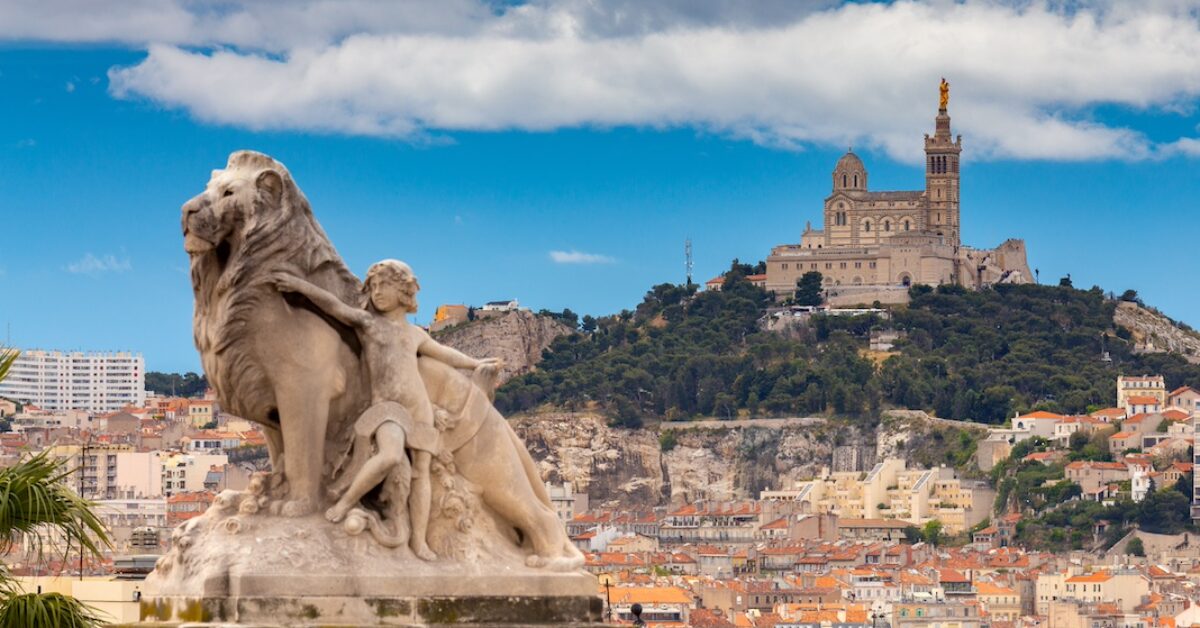
MuCEM (Museum of European and Mediterranean Civilisations)
MuCEM Architecture
The MuCEM stands out not only for its exhibits but also for its striking architecture. Completed in 2013, the museum showcases an innovative blend of modern design and historical elements. The use of concrete latticework allows natural light to filter through, creating enchanting play-of-light effects throughout the space.
- Seafront Location : Its stunning position by the Mediterranean enhances the museum’s appeal.
- Connecting Structures : The museum seamlessly links to the historic Fort Saint-Nicolas, showcasing a dialogue between the old and the new.
Exhibits at MuCEM
Inside, MuCEM offers a diverse range of exhibits that explore Mediterranean cultures and histories:
- Permanent Collections : Covering various aspects of life, from traditional crafts to contemporary art.
- Temporary Exhibitions : Regularly changing exhibitions that delve into pressing social and cultural themes.
- Interactive Displays : Engage with interactive installations that encourage reflection on multiculturalism and heritage.
Visiting MuCEM is a profoundly enriching experience, as it not only highlights the Mediterranean’s cultural tapestry but also invites visitors to ponder their place within it.

Calanques National Park
Overview of Calanques
Calanques National Park, a breathtaking gem situated between Marseille and Cassis, is known for its stunning limestone cliffs, azure waters, and secluded inlets. Stretching over 20 kilometers along the coast, the park offers impressive landscapes that vary from rugged mountains to tranquil beaches, making it a paradise for nature lovers.
- Biodiversity : Home to unique flora and fauna, including rare bird species and endemic plants.
- Protected Area : As a national park, Calanques aims to preserve its natural beauty while allowing visitors to explore responsibly.
Hiking and Swimming in Calanques National Park
Calanques National Park is a fantastic destination for outdoor activities:
- Hiking Trails : With various trails ranging from easy walks to challenging hikes, there is something for everyone. Popular routes include the pathways to Calanque de Sugiton and Calanque d’En-Vau.
- Swimming Opportunities : The crystal-clear waters in the calanques invite visitors for a refreshing dip after a long hike, with some secluded spots providing a tranquil atmosphere.
- Local Tips : Arriving early during the summer months ensures a less crowded experience, especially if you prefer swimming in peaceful surroundings.
Exploring Calanques National Park offers an unforgettable mix of adventure and relaxation amidst stunning natural beauty, making it an essential stop on any visit to Marseille.
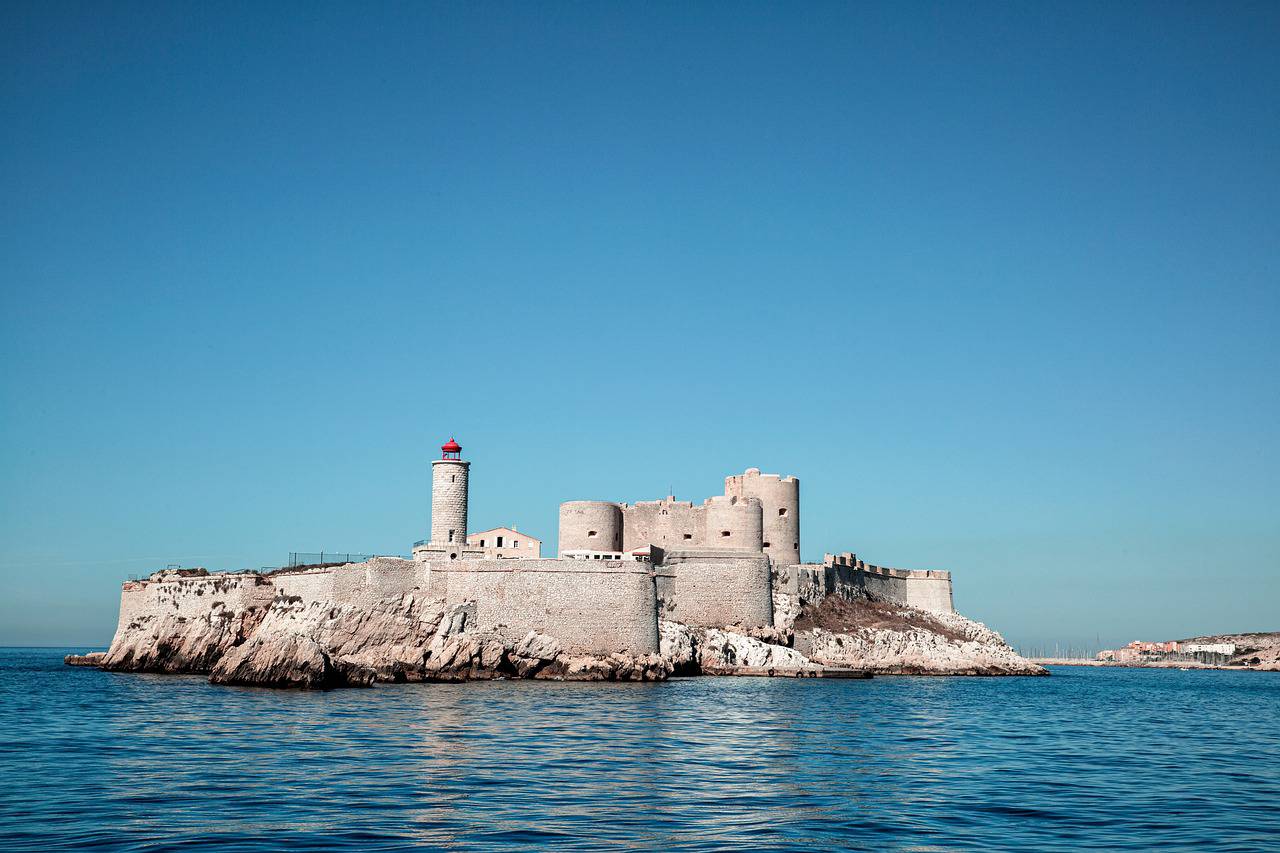
Château d’If
History of Château d’If
Château d’If, a small rocky island fortress, is steeped in history as France’s most infamous prison. Built in the late 16th century, it originally served as a stronghold against naval attacks but soon became notorious for housing political prisoners. Its imposing structure and isolation have captivated visitors for centuries.
- Strategic Location : Positioned just off the coast of Marseille, it guarded the city’s harbor.
- Prison Use : Many notable figures were imprisoned here, adding intrigue to its storied past.
The Count of Monte Cristo Connection
Château d’If is forever linked to Alexandre Dumas’ classic novel, “The Count of Monte Cristo.” In the story, the protagonist, Edmund Dantès, is unjustly imprisoned in the fortress, leading to his transformation into the vengeful Count of Monte Cristo.
- Literary Tourism : Fans of the novel often visit the château to explore the very place that inspired Dumas’ narrative.
- Symbolic Significance : The château represents themes of betrayal, resilience, and redemption that resonate through the book.
A trip to Château d’If not only offers a glimpse into its dramatic history but also provides a unique connection to Dumas’ literary masterpiece, enriching your experience in Marseille.

La Corniche
Scenic Drive along La Corniche
La Corniche is a breathtaking coastal road that stretches along the Mediterranean Sea, offering stunning views of Marseille’s coastline. As you drive, you’ll witness the cliffs, crystal-clear waters, and picturesque calanques, making it an unforgettable experience.
- Photo Opportunities : Pull over at scenic viewpoints to capture the magnificent seascapes.
- Tide Pools : Don’t forget to explore the tide pools, perfect for a closer look at the local marine life.
Promenade and Restaurants on La Corniche
Beyond the scenic drive, La Corniche is a wonderful place for a leisurely stroll or a delightful meal:
- Promenade ‘Les Plages’ : Enjoy a walk along the promenade, watching locals and visitors alike soaking up the sun.
- Dining Options : The area boasts charming restaurants and cafes offering fresh seafood and local specialties.
- Recommended Spots : Check out places like Le Seaquench for seafood with a view or the historic Le Neptune for classic Marseille dishes.
A visit to La Corniche combines natural beauty and local flavor, making it a perfect spot to unwind and enjoy the essence of Marseille.
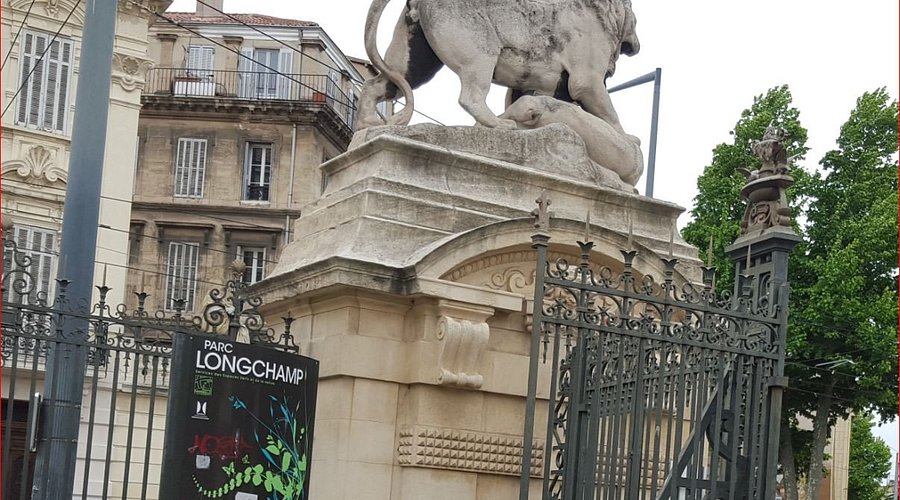
Palais Longchamp
Architecture of Palais Longchamp
Palais Longchamp is an architectural masterpiece that beautifully illustrates the grandeur of the 19th century. Designed by architect Henri-Jacques Espérandieu, the palace features a stunning combination of neoclassical and baroque styles, marked by its iconic fountain and impressive sculptures.
- Breathtaking Fountain : The main fountain, adorned with statues of lions and goddesses, serves as a striking centerpiece.
- Surrounding Gardens : Lush gardens create a serene ambiance, perfect for a leisurely walk or a picnic.
Museums within Palais Longchamp
Home to two major museums, Palais Longchamp offers a peek into Marseille’s rich history and culture:
- Musée des Beaux-Arts : This fine arts museum houses an extensive collection of paintings from the Renaissance to modern art. It’s a great spot for art enthusiasts to appreciate works by notable artists.
- Muséum d’Histoire Naturelle : Dedicated to the natural sciences, this museum showcases everything from fossils to taxidermy, engaging visitors of all ages with its unique exhibits.
A visit to Palais Longchamp not only immerses you in stunning architecture but also offers an enriching cultural experience through its museums, making it a highlight of any Marseille itinerary.

Marseille Cathedral
Features of Marseille Cathedral
Marseille Cathedral, also known as Cathédrale de la Major, is a striking example of Romanesque-Byzantine architecture. Its impressive façade, with alternating stripes of white limestone and green marble, captivates visitors before they even step inside.
- Magnificent Domes : The cathedral features two grand domes that soar majestically above its entrance.
- Intricate Interiors : Inside, the vast nave and beautiful mosaics create a serene atmosphere, making it a peaceful retreat from the city bustle.
Religious and Historical Significance
Beyond its architectural beauty, Marseille Cathedral holds considerable religious and historical importance:
- Architectural Heritage : Completed in 1893, it stands as a testament to the city’s rich cultural history.
- Spiritual Role : Serving as a cathedral for the Archdiocese of Marseille, it plays a crucial role in the spiritual life of the community.
As you explore the cathedral, you’ll not only appreciate its stunning artistry but also its deep connections to the history and faith of Marseille, adding another layer of meaning to your visit.

